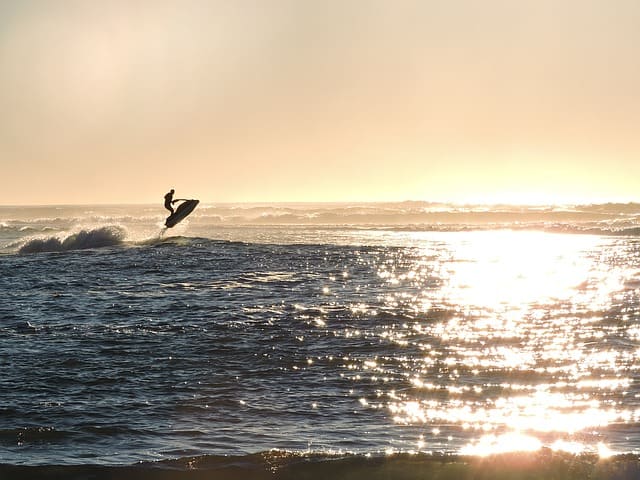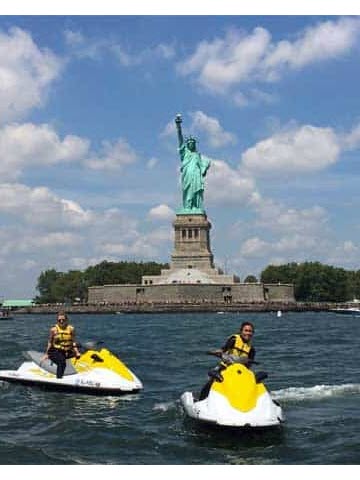How Old Do You Have to Be to Ride a Jet Ski?

Millions of Americans head to lakes, beaches or rivers each year when the days grow longer and temperatures rise, and many of them take to the water on jet skis. Blasting around on a personal watercraft (PWC) is an exciting and enjoyable way to spend a few summer hours, and kids can also enjoy the fun as long as a few basic safety precautions are taken. This post will give you some tips to make jet skiing with kids safe and fun and provide details about PWC age limits in every state.
Jet Skiing With Kids
While PWCs are thrilling and fun to ride, they can also be dangerous. According to the U.S. Coast Guard, about 1 in 3 jet ski injuries are suffered by riders under the age of 19. However, virtually all of the accidents that caused these injuries could have been prevented. Before heading out onto the water with children, make sure they are wearing personal floatation devices and understand that water can be treacherous even for strong swimmers.
You may be tempted to have your kids ride up front to make the ride even more exciting, but this can be dangerous if you hit a patch of rough water or have to slow down quickly. To reduce the chances of a mishap, the Coast Guard recommends seating kids between two adults on PWCs. It may also be a good idea to slow down a bit when kids are on board as speeds that adults find exhilarating could be scary for children.
Age Limit for Passengers on a Jet Ski
Running into trouble with the authorities is one of the best ways to ruin a day on the water, so it would be wise to learn about local rules and regulations before setting off. Almost all states have age restrictions in place for PWCs, and most require riders to take boater education courses.
Age Limit Broken Down by State
If you are wondering how old you have to be to ride a jet ski, here are the rules in every state and the District of Columbia:
- Alabama: The age limit for PWCs is 14 in Alabama, and all riders born after 1954 are required to take a safety course.
- Alaska: There are no PWC age restrictions or educational requirements in Alaska.
- Arizona: The age to ride a PWC is 12 in Arizona. A boater education course is recommended but not required.
- Arkansas: The PWC age restriction is 16 in Arkansas, and a boater safety course is mandatory for those born after 1986.
- California: The age limit for PWCs is 16 in California. There are no educational requirements.
- Colorado: The age to ride is 16 in Colorado, and riders aged 14 or 15 must take a safety course.
- Connecticut: The PWC age limit is 16 in Connecticut, and all riders must take a safety course.
- Delaware: The age to ride is set at 14 in Delaware, and a safety course is required for riders born in 1978 or later.
- District of Columbia: The age to ride is 13 in DC, and no education is required to operate a PWC under 16-feet long.
- Florida: The PWC age limit in Florida is 14, and a safety course is mandatory for riders under the age of 21.
- Georgia: The age to ride is 12 in Georgia, and a safety course is required for riders between 12 and 15 years of age.
- Hawaii: There are no PWC age restrictions or educational requirements in Hawaii.
- Idaho: There are no PWC age restrictions in Idaho, but safety training is required.
- Illinois: Children can take to the water at 12 years of age in Illinois. Boater education is required.
- Indiana: The PWC age limit is 15 in Indiana, and riders under the age of 16 must take a safety course.
- Iowa: The age to ride is 12 in Iowa. There are no educational requirements.
- Kansas: The age limit for PWCs is 16 in Kansas, but younger riders can take to the water if they receive safety training.
- Kentucky: Children as young as 12 can ride PWCs in Kentucky, but riders under the age of 17 must take a safety course.
- Louisiana: The age to ride is 13 in Louisiana, and all riders born after 1988 must take a safety course.
- Maine: The age to ride is 16 in Maine. There are no educational requirements.
- Maryland: The PWC age limit is 16 in Maryland, and safety training is required for riders born after 1972.
- Massachusetts: Riders can take to the water at 16 in Massachusetts, but training is required for those under 17 years of age.
- Michigan: Children as young as 12 can ride PWCs in Michigan, but safety training is mandatory for riders born after 1978.
- Minnesota: The PWC age limit is 14 in Minnesota, and safety training is required for riders under 17 years of age.
- Mississippi: The age to ride is 12 in Mississippi, but some training is required.
- Missouri: Riders can take to the water at 16 in Missouri, but those born after 1984 must take a safety course.
- Montana: The age to ride is 13 in Montana, but riders aged 13 and 14 must receive safety training.
- Nebraska: The PWC age limit is 14 in Nebraska, and safety training is required.
- Nevada: The age limit for PWCs is 14, and riders born after 1983 must take a safety course.
- New Hampshire: The age to ride is 16 in New Hampshire, and safety training is mandatory.
- New Jersey: The PWC age limit is 13 in New Jersey, and safety training is required.
- New Mexico: Riders can take to the water at 13 in New Mexico. There are no educational requirements.
- New York: The PWC age limit is 14 in New York, and safety training is required.
- North Carolina: The age to ride is 14 in North Carolina. Safety training is not required.
- North Dakota: Children as young as 12 can ride in North Dakota after taking a safety course.
- Ohio: The PWC age limit is 16 in Ohio. Safety training is required for riders born after 1982.
- Oklahoma: The age to ride is 12 in Oklahoma, and safety training is mandatory.
- Oregon: Riders can take to the water at 16 in Oregon after taking a safety course.
- Pennsylvania: The age limit for PWCs is 12 in Pennsylvania, and safety training is required.
- Rhode Island: Rhode Island sets the PWC age limit at 16 and requires all riders to receive safety training.
- South Carolina: The PWC age limit is 16 in South Carolina, but younger riders can take to the water after receiving safety training.
- South Dakota: The age to ride is 14 in South Dakota, and safety training is mandatory.
- Tennessee: Children as young as 12 can ride in Tennessee, but safety training is required for riders born after 1989.
- Texas: The PWC age limit is 13 in Texas, and training is required for riders born after 1984.
- Utah: The PWC age limit is 18 in Utah, but children as young as 12 can ride after receiving safety training.
- Vermont: The age to ride is 18 in Vermont, and safety training is mandatory.
- Virginia: The PWC age limit is 16 in Virginia, but younger children can ride after taking a safety course.
- Washington: The PWC age limit is 14 in Washington, and safety training is required.
- West Virginia: The age to ride is 15 in West Virginia, and training is required for riders born after 1986.
- Wisconsin: The PWC age limit is 16 in Wisconsin, but younger riders can enjoy the water after taking a safety course.
- Wyoming: The PWC age limit is 16 in Wyoming. There are no educational requirements.
Boating Education and License
You may have noticed that most states require some kind of safety training for PWC riders, and you could be wondering what that entails. These training courses are organized by the National Association of State Boating Law Administrators, and they briefly cover the basics of staying safe while enjoying the water. Classroom attendance is rarely required as these safety courses can usually be taken online. You can learn more about taking the New York safety course by clicking here. Once you have completed the course, you can download and print a safety certificate. This certificate is sometimes referred to as a boating license.
3 Unforgettable Rules for Jet Skiing With Kids
A sunny day, a calm stretch of water and a PWC are the perfect ingredients for summer fun and excitement, but safety should always come first. If you plan on taking kids out onto the water, here are three golden rules for you to follow:
- Wear life jackets: Personal flotation devices save thousands of lives each year, and they should be worn by any adult or child who takes to the water on a PWC.
- Seat children between adults: Children who ride up front can bang their heads on PWC handlebars when the water gets choppy. You wouldn’t drive a car with a kid on your lap, so apply the same logic out on the water.
- Take it easy: What’s thrilling for you could be terrifying for a kid, so slow down and make sure that everyone is having fun.
Memories Are Made of This

Check out Sea the City in New York
Riding on a PWC for the first time is an experience children will never forget, and it can be a safe and exciting way to spend a summer day. Follow the rules, take an online safety course and act responsibly, and you will give your kids memories that last a lifetime. If you are new to PWCs or would just like to combine time on the water with the sights of the Big Apple, you might want to think about booking a Sea the City New York Harbor Jet Ski Tour.
